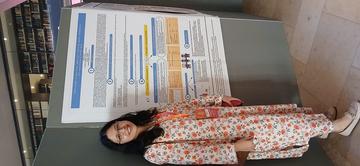DHOXSS 2024 - attending the Text to Tech strand
Maheen Zia was awarded a bursary to attend the Digital Humanities Oxford Summer School in 2024. To join the mailing list and learn about the next summer school sign up here. Read about Maheen's experience at the summer school here:
It was in February this year that I learnt of the opening of bursary applications through the DHOXSS Newsletter. Little had I expected that a few-hundred-word application would win me an experience of a lifetime. DHOxSS is a platform that brings together like-minded people from around the globe. The 2024 group was quite diverse, including academics, students, PhD scholars, researchers and highly-qualified professionals from around the world making use of technology in humanities contexts.
Humanities disciplines are typically based on theoretical knowledge and those working in this field might not be very well-versed in computational techniques. Therefore, DH trainings focusing on one particular point of intersection between humanities and tech, seem to be the only way forward in an academic world that is becoming more interdisciplinary than ever.
It was a 5-day intensive course where each strand targeted a different audience. The one that I attended was called ‘Text to Tech’, that focused on the application of digital methods to text. Different text retrieval techniques using python commands formed a significant portion of the content. Furthermore, the attendees were walked through other text-related technologies, starting from python programming and going all the way up to NLP concepts, LLMs, foundation language models and transfer learning. Thanks to my instructors Drs. Mariona Coll Ardanuy, Kaspar Beelen and Federico Nanni who would always come to our aid and be willing to provide one-on-one guidance on any problem we encountered. I salute them for their patience and openness to feedback.
Most of the same strand attendees had little to no expertise in computer programming, but the nature of their research demanded digital analysis of texts, which could be achieved by gaining some command over a certain portion of python programming. This was the target of the Text-to-Tech course that demanded no expert knowledge of programming and was especially designed for people working with texts.
Overall, the majority of the DHOxSS attendees as well as the instructors, more surprisingly, were not computer scientists. They initially started off as humanities researchers who aimed to learn and use digital approaches in their work. The world is moving towards multi and inter disciplinary trends in research, and digital humanities is one such niche. Therefore, more focused and directed DH courses and workshops can be thought of as a workable solution in an academic world that is evolving in this direction.
One thing I realized during the workshops and keynote addresses was the underrepresentation of the national and regional languages of Pakistan in academic and research literature. Urdu is a still a low resource language despite being ranked as the world’s 10th most spoken language.

Photograph from Maheen Zia
The program was very balanced overall, and some ‘play along with work’ was also planned. Post-session activity for day 1 was the poster exhibition at the Weston Library that stands at the heart of the Oxford campus. I stood next to my poster and exchanged scholarly insights with any visitors stopping by for a discussion. A walking tour was planned for the second day where a professional guide walked us around the historically important places in Oxford. Growing up, I had heard of those places but being there physically evoked stronger emotions and I ended up taking more than a hundred pictures. From the Harry Potter filming locations to the place where Alice in Wonderland was conceived, the tour managed to cover everything in one hour.
Moreover, the lunch and tea breaks served as a great networking opportunity for digital humanists to sit together and plan on future collaborations.
The sessions would end at 5 pm after which I had the entire evening to myself where other plans could be materialized. I made the most of that time and walked around the streets of Oxford on foot until the sunset. Solitude is one of the things that I enjoyed the most during that time. I would make a new list of places every day, mark them on Google maps and set out on my solo walking journey. Even though it was not the best time to visit the UK as per the news, Oxford felt really safe. Upon getting back to my room at St. Anne’s College, I would sit by the balcony and listen to silence until it was time to heat up the food in the fully equipped kitchenette, where a set of kitchen rules was pinned up on a cabinet in a very neat handwriting, and above all, a very polite tone. Honestly, I felt like playing “a week in the life of an Oxford student”.
Though I was the only bursary awardee from Pakistan, I never felt far from home. My country’s Independence Day fell during the DHOxSS week, and to my (pleasant) surprise, three of the course fellows turned up wearing Pakistani flag colours that day. Some lifelong connections beyond borders were built in that one week, which I will treasure forever. Even at meal-times, dietary preferences were taken care of and there was something for everyone, which was clearly indicative of the summer school ensuring inclusivity for a diverse group it hosted. The ‘human’ aspect of digital humanities stood out prominently.
DHOxSS was certainly more than just the one week I spent at Oxford as I come back home brimming with ideas and plans to transfer the newly acquired skills to the faculty and students at my university.




